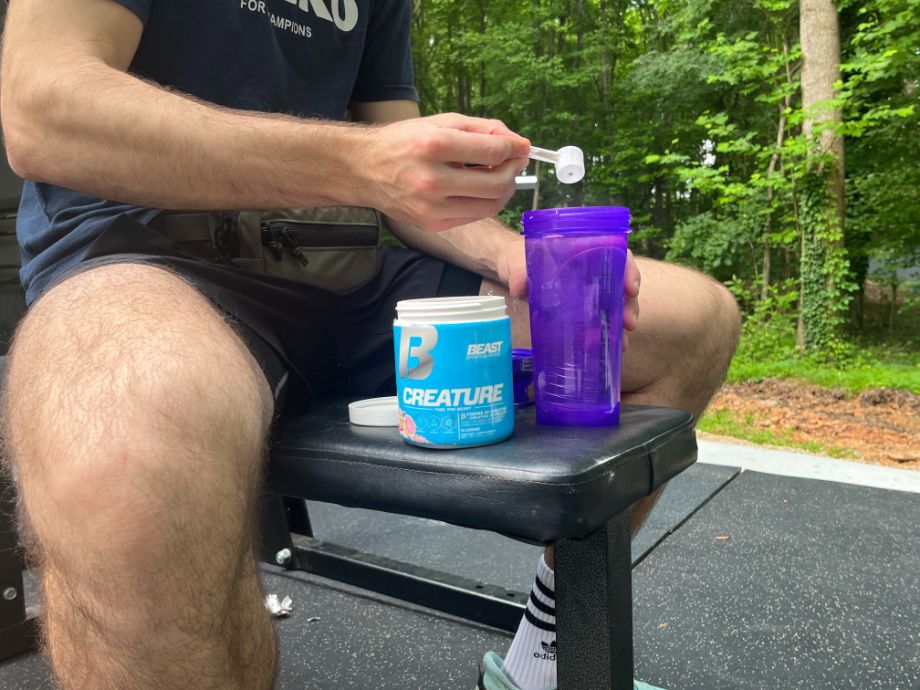We test and review fitness products based on an independent, multi-point methodology. If you use our links to purchase something, we may earn a commission. Read our disclosures.
Looking at an ingredient label can be a daunting task. Sometimes there’s just a lot to look at, but even if you’re looking at the best natural pre-workouts with a low number of ingredients, it can be confusing to know what each ingredient’s purpose is.
Take creatine, for example. Some people mistakenly think that creatine has caffeine in it and are worried to take the supplement prior to bedtime. Does creatine have caffeine? I’m here to tell you, no, it doesn’t.
We’ll go deeper than that, however; we’ll look into these two supplements and discover the benefits of both creatine and caffeine, as well as possible side effects to look out for. Additionally, I talked with USA Weightlifting sports dietitian Meagan O’Connor on her thoughts about these products and their benefits. Read on to learn if either, or both, of these performance-enhancing supplements are right for you.
Medical disclaimer: This article is intended for educational and informational purposes only. It is not intended as a substitute for medical advice. For health advice, contact a licensed healthcare provider.
Does Creatine Have Caffeine?
No, creatine doesn’t have caffeine in it. Creatine is made up of amino acids and wouldn’t naturally have any caffeine within it. Creatine won’t give you the energy boost that people associate with caffeine or other stimulants—although both have been shown to have ergogenic effects1 that help improve athletic performance2.
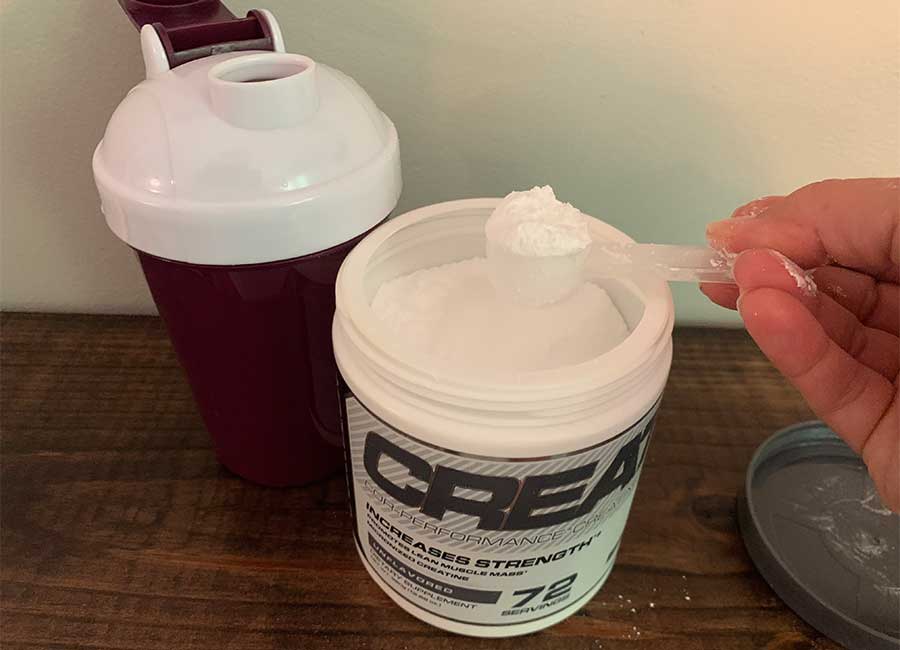
Many people tend to think that creatine has caffeine or some sort of stimulant in it because creatine is a common ingredient in pre-workout supplements. The best pre-workouts often contain both creatine and caffeine, so people associate the two together. However, both of these ingredients are unique and yield different effects to athletes and consumers.
RELATED: Best Pre-Workout with Creatine
What Is Caffeine?
Caffeine is a natural stimulant found in foods such as coffee and tea. It is also added to supplements like pre-workouts and energy drinks, due to its effects on endurance levels and focus.
RELATED: Best Pre-Workout Ingredients
What Is Creatine?
Creatine3 is built from three different amino acids: glycine, arginine, and methionine. It’s a naturally occurring amino acid both processed by the body—through the pancreas, kidneys, and liver—as well as found in foods, such as red meat, fish, and other animal proteins. The majority of creatine is stored in muscle cells as phosphocreatine, but some is stored in the brain tissue, as well.
The main responsibility of creatine in the body is to produce ATP, or adenosine triphosphate, your body’s energy source responsible for dynamic movements such as sprinting or resistance training.
While it’s not an essential amino acid, creatine is extremely popular as a supplement, due to its heavily-researched support of improving athletic performance. The typical recommended daily dose4 of creatine to supplement high-intensity exercise is between 3 to 5 grams of creatine each day. However, you can begin creatine supplementation with a creatine loading phase, where you take four or five 5-gram doses a day, with the goal of saturating the skeletal muscle cells in about a week.
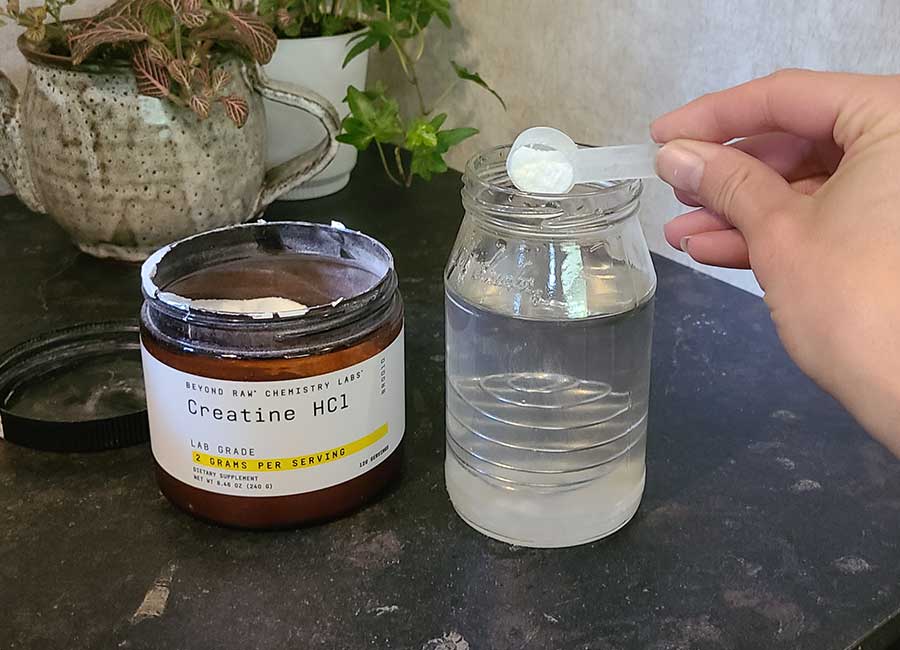
There are several types of creatine available, such as creatine HCl and creatine phosphate, but the most researched5 type of creatine is creatine monohydrate. Creatine monohydrate has also been consistently shown to be the most effective at building muscle and improving performance in athletes.
RELATED: Creatine HCl vs Monohydrate
Is Creatine a Stimulant?
Simply put, no, creatine isn’t a stimulant. A stimulant like the caffeine in a cup of coffee has acute excitatory effects, meaning you’ll have an immediate short-term effect. The effects of creatine are on a cellular level—replenishing ATP—so you won’t feel an immediate energy boost.
By replenishing energy stores on the cellular level, creatine may allow you to have more energy for a workout, but it is a long-term effect by saturating the muscle cells with the amino acid. Therefore, it won’t have the same effect as a stimulant.
Benefits of Creatine and Caffeine
Both of these dietary supplements have been shown to be able to help you in your strength training or athletic performance, albeit in their own ways. Here’s a look at the general benefits of creatine and caffeine.
Benefits of Creatine
The many benefits of creatine have been researched thoroughly. The more popular positive effects for bodybuilders, athletes, and fitness enthusiasts have to do with athletic performance and muscle growth.
- Increased Athletic Performance: A 2018 study6 followed 30 athletes and tested them in one-rep-max half squats and plyometric jumps, with some of them supplementing with creatine and others with a placebo. Those supplementing with creatine showed marked improvement in their strength training and maximal lifts in just four weeks.
- Improved Muscle Recovery: A June 2021 review7 showed the potential for creatine as a muscle recovery supplement. Creatine was shown to maybe speed up recovery time, due to its ability to mitigate muscle damage and restore lost power potential faster after exercise and high-intensity training.
- Building Lean Muscle Mass: In a 2022 review from the journal Nutrients5, it was remarked—after looking at a decade of studies and trials—that groups supplementing with creatine always have an increase in lean muscle mass greater than those given a placebo.
Benefits of Caffeine
The International Society of Sports Nutrition8 claims that caffeine has been shown to improve athletic performance among trained athletes and untrained individuals. Also, it can help improve cognitive function in individuals. The widely accepted reason for its performance-enhancing properties is its effects on the central nervous system, and how it affects perceived exertion.
While the International Society of Sports Nutrition notes that improved performance occurs with a daily intake of 3 to 6 milligrams of caffeine per kilogram of body weight, it also remarks to keep caffeine levels on the lower side. Intake of over 9 milligrams of caffeine per kilogram of body weight has been shown to produce negative side effects, and that amount isn’t needed for an ergogenic effect on the individual.8
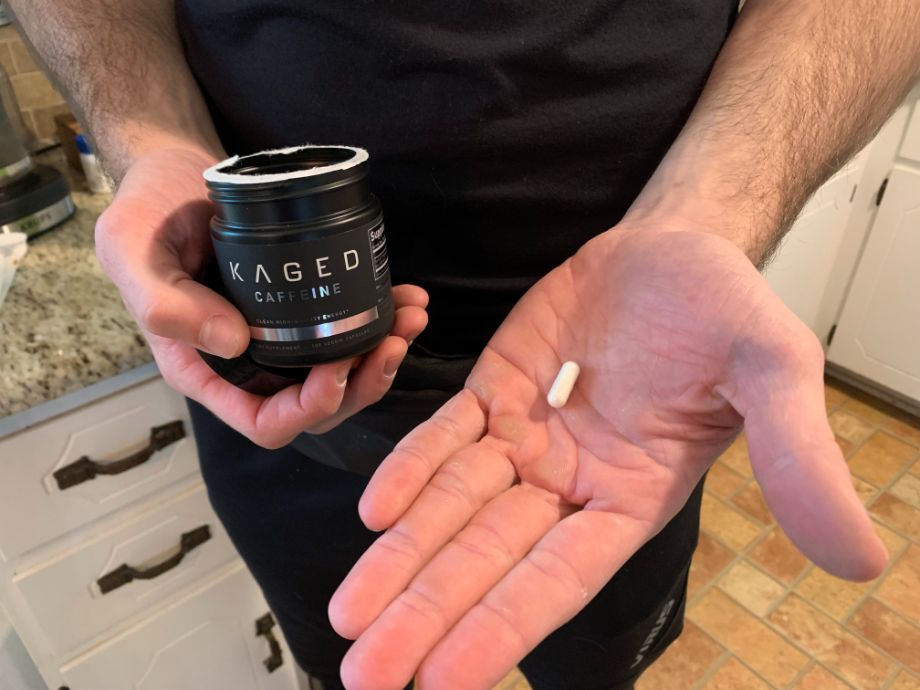
Additionally, the Food and Drug Administration9 (FDA) recommends a daily intake of no more than 400 milligrams of caffeine, as this amount is rarely seen to have adverse side effects. With that said, your sensitivity to caffeine will greatly impact your risk for negative side effects; err on the side of caution when having caffeine.
Can You Mix Creatine and Caffeine Together?
Creatine and caffeine are common ingredients in pre-workouts, but is it ideal to take these two supplements together? While the physical performance benefits of both creatine and caffeine ingestion have been thoroughly researched and documented, the research on combining these is a bit mixed.
A study from May 201610 tested four groups of athletes: one group supplementing with creatine, one group with creatine and coffee, another with creatine and anhydrous caffeine, and the last group supplementing with a placebo. The athletes were tested in bench press, leg press, and dynamic sprints. The study concluded that there was no significant difference between any of the groups. This infers that the caffeine may stunt the effects of creatine, or vice versa.
However, a 2015 review11 dug deeper into previous studies to see the actual relation between caffeine and creatine. Although a couple of studies have shown the two supplements to negate benefits, the review suggests that a possible reason for this could deal with opposing effects of muscle relaxation time, or due to stomach discomfort and gastrointestinal issues that occurred due to ingesting both supplements at the same time.
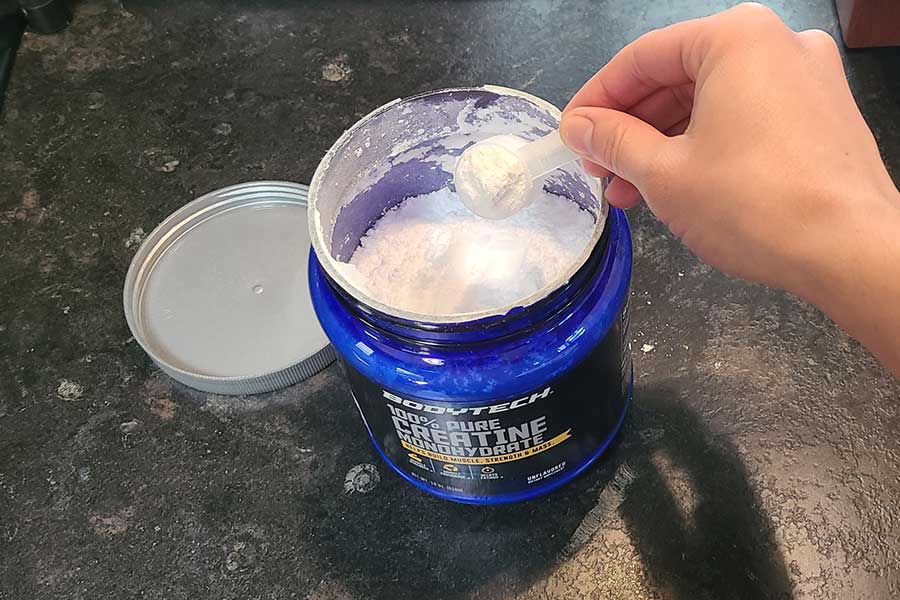
With the major side effect being a risk of stomach problems, Meagan says it is OK to mix creatine and caffeine together, since creatine doesn’t contain any extra caffeine. However, if you know you’re prone to digestive issues, or you’re worried about getting the most out of your supplements, you can take them separately. Because creatine isn’t a stimulant, you can take it any time of the day, whereas caffeine is better to be consumed earlier in the day, especially if you have sensitivity to it.
Possible Side Effects
Although both creatine and caffeine have benefits to aid your fitness goals, it’s important to note some of the possible side effects. Remember that keeping these supplements to the recommended daily doses will help reduce your risk of negative side effects.
Side Effects of Creatine
As the most heavily researched supplement on the market, creatine is also one of the safest, with very few side effects that go beyond being an annoyance. Still, there is potential for some side effects and discomfort, so be aware.
RELATED: Creatine Side Effects
- Weight Gain: Does creatine make you gain weight? It can, although not in the way you’d typically think. Creatine draws water into the muscle cells, making you retain water. This water retention is what causes the initial weight gain; it’s more common in large doses, too, like during a loading phase. Creatine can cause increased muscle mass in the long-term5, which may lead to weight gain, as well.
- Digestive Issues: Creatine, like many supplements, can cause some stomach problems, such as bloating, diarrhea, or stomach pain. It’s more common when creatine is taken in large doses. For example, a 2008 study12 showed athletes taking larger, 10-gram doses experienced diarrhea and similar issues far more frequently than those on a recommended 5-gram daily dose.
Side Effects of Caffeine
The possibility of adverse effects from caffeine supplementation are greatly increased when ingesting more than the recommended amount by the FDA of 400 milligrams daily. However, according to the International Society of Sports Nutrition8, certain side effects can come up from using caffeine at lower doses if you have a genetic sensitivity to it.
Meagan says that most people will notice benefits from 3 milligrams of caffeine per kilogram of bodyweight, but might start to experience negative effects once over 6 to 9 milligrams per kilogram of bodyweight. Common side effects of caffeine can include an increased heart rate and blood pressure, anxiety, a jittery feeling, inability to focus, an upset stomach, and lower sleep quality.
Ingesting an amount higher than the recommended 400 milligrams in a day can potentially cause a caffeine overdose, leading to medical complications like an irregular heartbeat or seizures.
Be careful when using pre-workouts and energy drinks. Know your own sensitivities to caffeine, and also know what ingredients and quantities are in your supplements.
Does Creatine Have Caffeine? Final Thoughts
Although commonly in pre-workout formulas together, creatine on its own doesn’t contain caffeine, and caffeine doesn’t contain creatine. Both creatine and caffeine have been shown to aid in athletic performance, although in different ways. However, these benefits are shown to be best when ingested at the recommended daily doses:
- Creatine: The daily dose is 3 to 5 grams of creatine per day, with an optional loading phase at the start, where you take 20 to 25 grams per day, split up in 5-gram doses.
- Caffeine: The FDA recommends no more than 400 milligrams of caffeine each day. Going above this significantly increases your risk of adverse effects and medical complications.
Also, as a good rule of thumb, always be aware of the ingredients in the supplements you take. Understand what the ingredients do and how much is in each serving. This is why we always recommend looking for products that have been third-party tested and don’t contain proprietary blend.
Does Creatine Have Caffeine? Q&A
Does creatine give you energy like coffee?
Creatine is not a stimulant like coffee, and won’t provide the feeling of energy like coffee would. Instead, creatine helps replenish the energy source for muscles, ATP, which will help aid you with more energy on the cellular level. So while you may not feel an energy boost like coffee or caffeine may provide, creatine can provide you with energy to allow you to train longer and more effectively.
What is the recommended dosage of creatine?
The commonly recommended dosage of creatine for regular training and supplementation is between 3 and 5 grams of creatine per day.
What is the safety level of creatine?
As one of the most researched supplements on the market, creatine is considered safe for most people. The main potential side effects include a chance for initial weight gain (due to water retention), as well as a potential for digestive issues.
How do you take creatine?
Creatine supplements are made most commonly in a crystalized powder form, which is easily soluble in water or protein shakes. However, creatine does come in capsules and even creatine gummies.
These statements have not been evaluated by the Food and Drug Administration. This product is not intended to diagnose, treat, cure, or prevent any diseases.
References
- Ray TR, Eck JC, Covington LA, Murphy RB, Williams R, Knudtson J. Use of oral creatine as an ergogenic aid for increased sports performance: perceptions of adolescent athletes. South Med J. 2001 Jun;94(6):608-12. PMID: 11440329.
- Grgic, J., Trexler, E.T., Lazinica, B. et al. Effects of caffeine intake on muscle strength and power: a systematic review and meta-analysis. J Int Soc Sports Nutr 15, 11 (2018). https://doi.org/10.1186/s12970-018-0216-0
- Creatine. Mayo Clinic. Feb 9, 2021.
- Antonio, J., Candow, D.G., Forbes, S.C. et al. Common questions and misconceptions about creatine supplementation: what does the scientific evidence really show?. J Int Soc Sports Nutr 18, 13 (2021). https://doi.org/10.1186/s12970-021-00412-w
- Wu SH, Chen KL, Hsu C, Chen HC, Chen JY, Yu SY, Shiu YJ. Creatine Supplementation for Muscle Growth: A Scoping Review of Randomized Clinical Trials from 2012 to 2021. Nutrients. 2022 Mar 16;14(6):1255. doi: 10.3390/nu14061255. PMID: 35334912; PMCID: PMC8949037.
- Wang CC, Fang CC, Lee YH, Yang MT, Chan KH. Effects of 4-Week Creatine Supplementation Combined with Complex Training on Muscle Damage and Sport Performance. Nutrients. 2018 Nov 2;10(11):1640. doi: 10.3390/nu10111640. PMID: 30400221; PMCID: PMC6265971.
- Wax B, Kerksick CM, Jagim AR, Mayo JJ, Lyons BC, Kreider RB. Creatine for Exercise and Sports Performance, with Recovery Considerations for Healthy Populations. Nutrients. 2021 Jun 2;13(6):1915. doi: 10.3390/nu13061915. PMID: 34199588; PMCID: PMC8228369.
- Guest NS, VanDusseldorp TA, Nelson MT, Grgic J, Schoenfeld BJ, Jenkins NDM, Arent SM, Antonio J, Stout JR, Trexler ET, Smith-Ryan AE, Goldstein ER, Kalman DS, Campbell BI. International society of sports nutrition position stand: caffeine and exercise performance. J Int Soc Sports Nutr. 2021 Jan 2;18(1):1. doi: 10.1186/s12970-020-00383-4. PMID: 33388079; PMCID: PMC7777221.
- Commissioner, O. of the. (n.d.). Spilling the beans: How much caffeine is too much? U.S. Food and Drug Administration. Retrieved March 4, 2023, from https://www.fda.gov/consumers/consumer-updates/spilling-beans-how-much-caffeine-too-much
- Trexler ET, Smith-Ryan AE, Roelofs EJ, Hirsch KR, Persky AM, Mock MG. Effects of Coffee and Caffeine Anhydrous Intake During Creatine Loading. J Strength Cond Res. 2016 May;30(5):1438-46. doi: 10.1519/JSC.0000000000001223. PMID: 26439785; PMCID: PMC4808512.
- Trexler ET, Smith-Ryan AE. Creatine and Caffeine: Considerations for Concurrent Supplementation. Int J Sport Nutr Exerc Metab. 2015 Dec;25(6):607-23. doi: 10.1123/ijsnem.2014-0193. PMID: 26219105.
- Ostojic SM, Ahmetovic Z. Gastrointestinal distress after creatine supplementation in athletes: are side effects dose dependent? Res Sports Med. 2008;16(1):15-22. doi: 10.1080/15438620701693280. PMID: 18373286.
Further reading

“What is VO2 max?” is a common question in fitness. Learn how to measure and use this metric in your pursuit of cardiovascular fitness. Read more

Strength training for runners is critical for injury prevention, not to mention it brings the benefits of power and muscular endurance. Get started here. Read more

In our Gold’s Gym GG480 review, we break down this now-discontinued treadmill and offer alternatives. Read more

Check out this Sunny Health & Fitness Magnetic Elliptical review to find out why you should consider this cardio machine if you’re looking for a beginner friendly budget option. Read more

